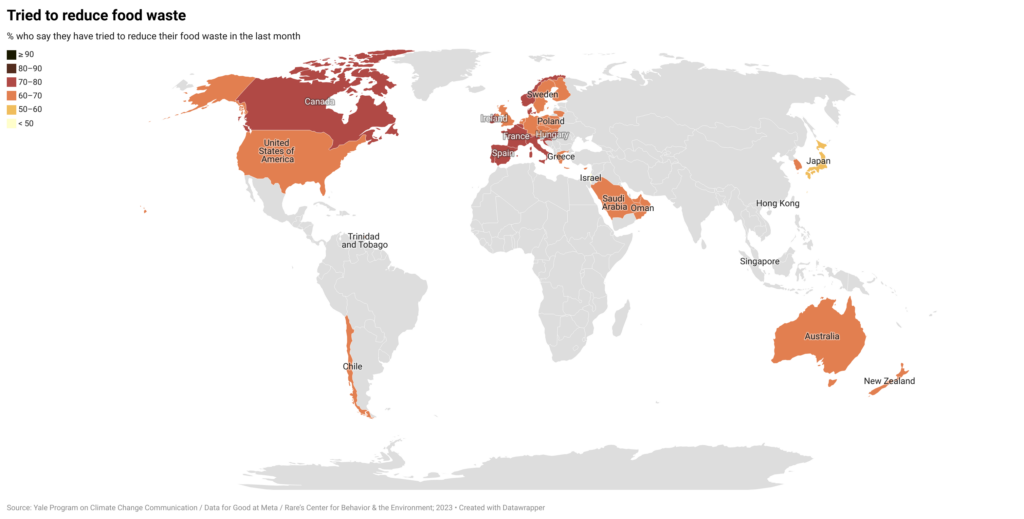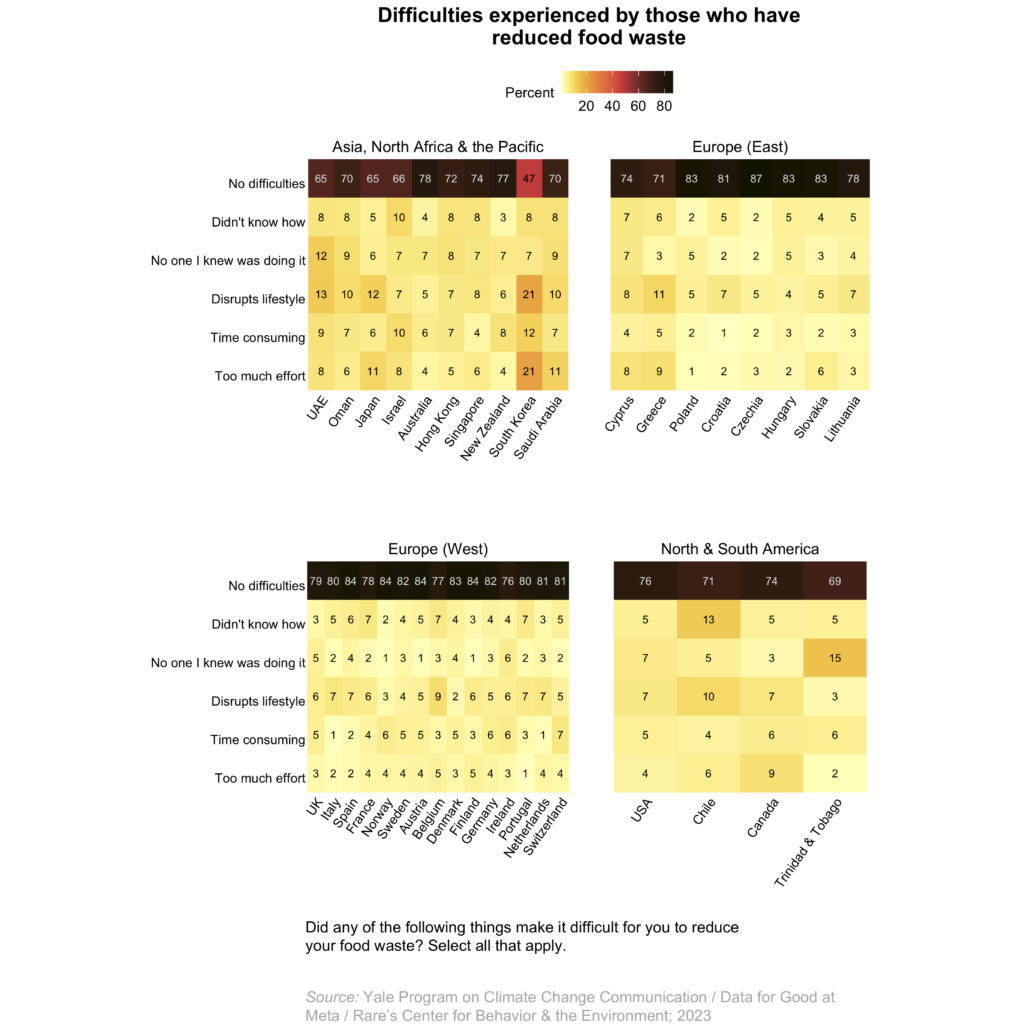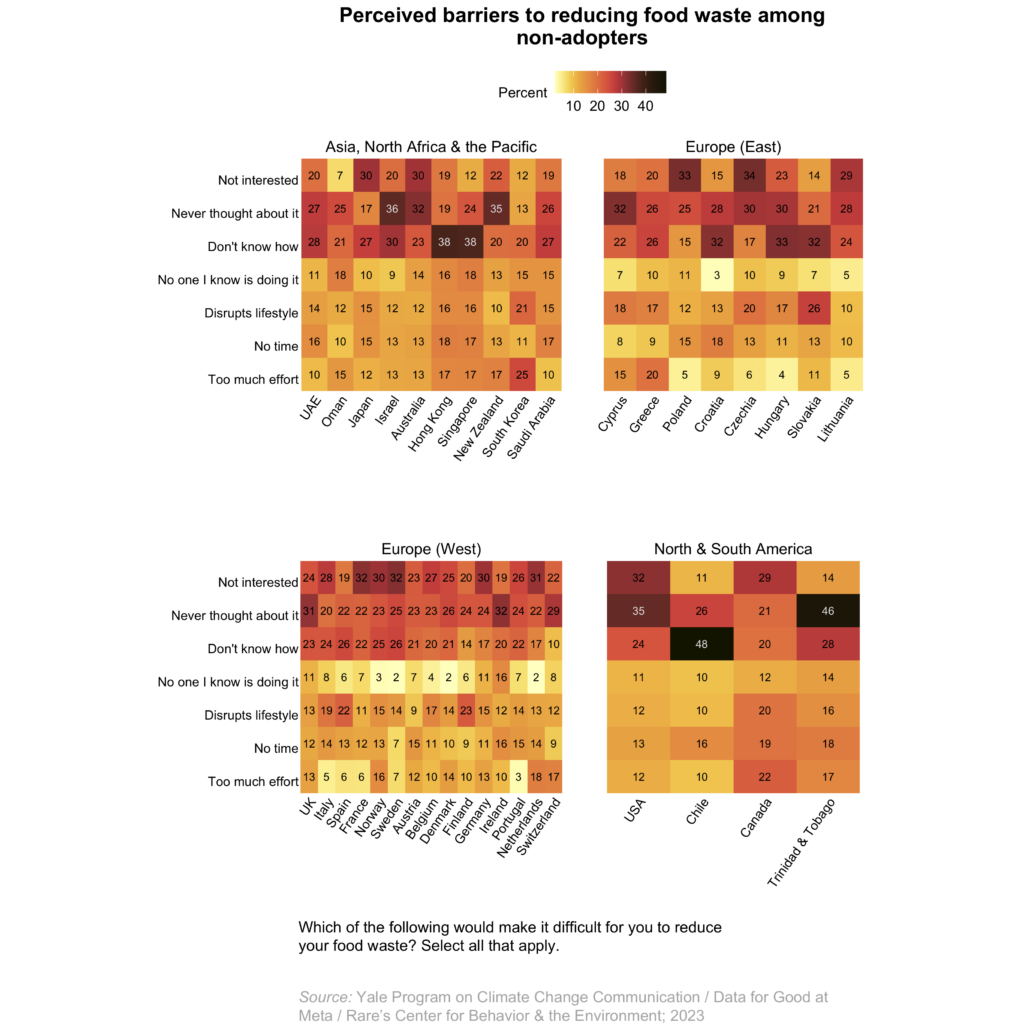Report · Jun 6, 2024
International Public Opinion on Climate Change: Household Climate Actions – Adoption and Barriers, 2023
By Anthony Leiserowitz, Jennifer Carman, Emily Goddard, Erik Thulin, Emily Wood, Marija Verner, Natalia Ordaz Reynoso, Seth Rosenthal, Jennifer Marlon and Nicole Buttermore
Filed under: Behaviors & Actions and Beliefs & Attitudes
2. Reducing Food Waste
2.1. Majorities of respondents in most countries and territories said they had tried to reduce food waste.
A majority of respondents (more than 50%) in 36 out of 37 surveyed countries and territories said they had tried to reduce their food waste in the prior month. Respondents in France (79%), Croatia (78%), and Italy (77%) were the most likely to say so, while respondents in the United States (60%), Japan (55%), and Israel (43%) were the least likely.
2.2. Most respondents who had tried to reduce food waste in the prior month said they faced no difficulties doing so.
Among respondents who said they had tried to reduce food waste in the prior month, majorities in nearly all countries and territories said they did not have any difficulties doing so. Respondents in Europe were most likely to say they had not had difficulties, with large majorities saying so in Czechia (87%), and in Spain, Austria, Norway, and Finland (all 84%). The only country where fewer than 50% of respondents said they did not face any difficulties in reducing their food waste was South Korea (47%).
However, other respondents who had adopted this behavior did report facing some difficulties. South Korea (21%), the United Arab Emirates (13%), and Japan (12%) had the largest percentages of respondents who said they thought the changes to their shopping routines would disrupt their lifestyle.Respondents were allowed to select more than one answer to this question, unless they selected “I didn’t have any difficulties.” South Korea (21%), Japan (11%), and Saudi Arabia (11%) had the largest percentages who said they thought it would take too much effort. Trinidad & Tobago (15%), the United Arab Emirates (12%), and Oman (9%) had the largest percentages who said that no one they knew was trying to reduce their food waste. Chile (13%) and Israel (10%) had the largest percentages who said that they did not know how to reduce their food waste. Finally, South Korea (12%), Israel (10%), and New Zealand (8%) had the largest percentages who said that it took a lot of time to reduce their food waste.
2.3. Among those who had not tried to reduce food waste, the most common barriers were not having thought about it, not knowing how, or not being interested.
Among those who said they had not tried to reduce food waste in the prior month, the most common reasons for not doing so (i.e., “barriers”) were that they had never thought about trying to reduce their food waste, did not know how, or were not interested in doing it.Respondents were allowed to select more than one answer to this question.
Respondents in Trinidad & Tobago (46%), Israel (36%), and New Zealand and the United States (both 35%) were most likely to say that they had never thought about trying to reduce their food waste. Respondents in Chile (48%), and Hong Kong and Singapore (both 38%) were most likely to say they did not know how to reduce their food waste. Respondents in Czechia (34%), Poland (33%), and the United States (32%) were most likely to say they were not interested in doing this.
Among other barriers to reducing food waste, Slovakia (26%), Finland (23%), and Spain (22%) had the largest percentages of respondents who said the changes to their shopping routine would disrupt their lifestyle. South Korea (25%), Canada (22%), and Greece (20%) had the largest percentages who said reducing food waste is too much effort. Canada (19%), and Trinidad & Tobago, Croatia, and Hong Kong (all 18%) had the largest percentages who said they do not have time. Finally, Oman and Singapore (both 18%), and Hong Kong and Ireland (both 16%) had the largest percentages who said that no one they know is trying to reduce their food waste.


